- Home
- Piers Anthony
Split Infinity
Split Infinity Read online
INVITATION TO MAGIC
Stile stared down at the amulet. Belief in magic! Yet the fellow seemed sensible in other respects. Maybe it was a joke, an initiation rite to see what foolishness newcomers could be talked into.
He shook his head. “All right, I’ll play the game—once. Amulet, I invoke you.” And he put the chain over his head.
Suddenly, he was strangling. The chain was constricting, cutting off his wind and blood. The amulet seemed to be expanding, its demon figure holding the ends of the chain in miniature hands, grinning evilly. Stile ducked his chin down against his neck and tightened his muscles. He grabbed the grinning demon by its two little arms to haul them apart.
But still the demon grew, and its strength increased in proportion. It drew its arms together, constricting the loop about Stile’s neck.
The demon had become a living creature, swelling horrendously as it fought. Now it was half the size of Stile and fiendishly strong. Stile felt his consciousness going. And the demon was still growing …
A Del Rey® Book
Published by The Random House Publishing Group
Copyright © 1980 by Piers Anthony Jacob
All rights reserved under International and Pan-American Copyright Conventions. Published in the United States by Del Rey Books, an imprint of The Random House Publishing Group, a division of Random House, Inc., New York, and simultaneously in Canada by Random House of Canada Limited, Toronto.
Del Rey is a registered trademark and the Del Rey colophon is a trademark of Random House, Inc.
www.delreybooks.com
Library of Congress Catalog Card Number: 79-20282
eISBN: 978-0-307-81567-5
Map by Chris Barbieri
v3.1_r2
Table of Contents
Cover
Title Page
Copyright
Map of Phaze
1. Slide
2. Sheen
3. Race
4. Curtain
5. Fantasy
6. Manure
7. Neysa
8. Music
9. Promotion
10. Magic
11. Oracle
12. Black
13. Rungs
14. Yellow
15. Games
16. Blue
17. Tourney
18. Oath
Other Books by This Author
CHAPTER 1
Slide
He walked with the assurance of stature, and most others deferred to him subtly. When he moved in a given direction, the way before him conveniently opened, by seeming coincidence; when he made eye contact, the other head nodded in a token bow. He was a serf, like all of them, naked and with no physical badge of status; indeed, it would have been the depth of bad taste to accord him any overt recognition. Yet he was a giant, here. His name was Stile.
Stile stood one point five meters tall and weighed fifty kilograms. In prior parlance he would have stood four feet, eleven inches tall and weighed a scant hundredweight or eight stone; or stood a scant fifteen hands and weighed a hundred and ten pounds. His male associates towered above him by up to half a meter and outweighed him by twenty-five kilos.
He was fit, but not extraordinarily muscled. Personable without being handsome. He did not hail his friends heartily, for there were few he called friend, and he was diffident about approaches. Yet there was enormous drive in him that manifested in lieu of personal warmth.
He walked about the Grid-hall of the Game-annex, his favorite place; beyond this region he reverted to the nonentity that others perceived. He sought competition of his own level, but at this hour there was none. Pairs of people stood in the cubicles that formed the convoluted perimeter of the hall, and a throng milled in the center, making contacts. A cool, gentle, mildly flower-scented draft wafted down from the vents in the ceiling, and the image of the sun cast its light on the floor, making its own game of shadows.
Stile paused at the fringe of the crowd, disliking this forced mixing. It was better when someone challenged him.
A young woman rose from one of the seats. She was nude, of course, but worthy of a second glance because of the perfection of her body. Stile averted his gaze, affecting not to be aware of her; he was especially shy with girls.
A tall youth intercepted the woman. “Game, lass?” How easy he made it seem!
She dismissed him with a curt downward flip of one hand and continued on toward Stile. A child signaled her: “Game, miss?” The woman smiled, but again negated, more gently. Stile smiled too, privately; evidently she did not recognize the child, but he did: Pollum, Rung Two on the Nines ladder. Not in Stile’s own class, yet, but nevertheless a formidable player. Had the woman accepted the challenge, she would probably have been tromped.
There was no doubt she recognized Stile, though. His eyes continued to review the crowd, but his attention was on the woman. She was of average height—several centimeters taller than he—but of more than average proportions. Her breasts were full and perfect, unsagging, shifting eloquently with her easy motion, and her legs were long and smooth. In other realms men assumed that the ideal woman was a naked one, but often this was not the case; too many women suffered in the absence of mechanical supports for portions of their anatomy. This one, approaching him, was the type who really could survive the absence of clothing without loss of form.
She arrived at last. “Stile,” she murmured.
He turned as if surprised, nodding. Her face was so lovely it startled him. Her eyes were large and green, her hair light brown and light-bleached in strands that expanded about her neck. There was a lot of art in the supposedly natural falling of women’s hair. Her features were even and possessed the particular properties and proportions that appealed to him, though he could not define precisely what these were. His shyness loomed up inside him, so that he did not trust himself to speak.
“I am Sheen,” she said. “I would like to challenge you to a Game.”
She could not be a top player. Stile knew every ranking player on every age-ladder by sight and style, and she was on no ladder. Therefore she was a dilettante, an occasional participant, possibly of some skill in selected modes but in no way a serious competitor. Her body was too lush for most physical sports; the top females in track, ball games, and swimming were small-breasted, lean-fleshed, and lanky, and this in no way described Sheen. Therefore he would have no physical competition here.
Yet she was beautiful, and he was unable to speak. So he nodded acquiescence. She took his arm in an easy gesture of familiarity that startled him. Stile had known women, of course; they came to him seeking the notoriety of his company, and the known fact of his hesitancy lent them compensating courage. But this one was so pretty she hardly needed to seek male company; it would seek her. She was making it look as if he had sought and won her. Perhaps he had, unknowingly: his prowess in the Game could have impressed her enough from afar to bring her to him. Yet this was not the type of conquest he preferred; such women were equally avid for Game-skilled teeners and grayheads.
They found an unoccupied cubicle. It had a column in the center, inset with panels on opposite sides. Stile went to one side, Sheen on the other, and as their weights came on the marked ovals to the floor before each panel, the panels lighted. The column was low, so Stile could see Sheen’s face across from him; she was smiling at him.
Embarrassed by this open show of camaraderie, Stile looked down at his panel. He hardly needed to; he knew exactly what it showed. Across the top were four categories: PHYSICAL—MENTAL—CHANCE—ART, and down the left side were four more: NAKED—TOOL—MACHINE—ANIMAL. For shorthand convenience they were also lettered and numbered: 1—2—3—4 across the top, A—B—C—D down the side. The numbers were highlighted: the
Grid had given him that set of choices, randomly.
THE GAME: PRIMARY GRID
Stile studied Sheen’s face. Now that she was in the Game, his opponent, his diffidence diminished. He felt the mild tightening of his skin, elevation of heartbeat, clarity of mind, and mild distress of bowel that presaged the tension and effort of competition. For some people such effects became so strong it ruined them as competitors, but for him it was a great feeling that drew him back compulsively. He lived for the Game!
Even when his opponent was a pretty girl whose pert breasts peeked at him just above the column. What was passing through her mind? Did she really think she could beat him, or was she just out for the experience? Had she approached him on a dare, or was she a groupie merely out for a date? If she were trying to win, she would want to choose ART, possibly MENTAL, and would certainly avoid PHYSICAL. If she were on a dare she would go for CHANCE, as that would require little performance on her part. If she wanted experience, anything would do. If she were a groupie, she would want PHYSICAL.
Of course she could not choose among these; he had the choice. But his choice would be governed in part by his judgment of her intent and ability. He had to think, as it were, with her mind, so that he could select what she least desired and obtain the advantage.
Now he considered her likely choice, in the series she did control. A true competitor would go for NAKED, for there was the essence of it: unassisted personal prowess. One wanting experience could go for anything, again depending on the type of experience desired. A dare would probably go for NAKED also; that choice would be part of the dare. A groupie would certainly go for NAKED. So that was her most likely choice.
Well, he would call her bluff. He touched PHYSICAL, sliding his hand across the panel so she couldn’t tell his choice by the motion of his arm.
Her choice had already been made, as anticipated. They were in 1A, PHYSICAL/NAKED.
The second grid appeared. Now the categories across the top were 1. SEPARATE—2. INTERACTIVE—3. COMBAT—4. COOPERATIVE, and down the side were A. FLAT SURFACE—B. VARIABLE SURFACE—C. DISCONTINUITY—D. LIQUID. The letters were highlighted; he had to choose from the down column this time. He didn’t feel like swimming or swinging from bars with her, though there could be intriguing aspects to each, so the last two were out. He was an excellent long-distance runner, but doubted Sheen would go for that sort of thing, which eliminated the flat surface. So he selected B, the variable surface.
She chose 1. SEPARATE: no groupie after all! So they would be in a race of some sort, not physically touching or directly interacting, though there were limited exceptions. Good enough. He would find out what she was made of.
Now the panel displayed a listing of variable surfaces. Stile glanced again at Sheen. She shrugged, so he picked the first: MAZE PATH. As he touched it, the description appeared in the first box of a nine-square grid.
She chose the second: GLASS MOUNTAIN. It appeared in the second square.
He placed DUST SLIDE in the third square. Then they continued with CROSS COUNTRY, TIGHTROPE, SAND DUNES, GREASED HILLS, SNOW BANK, and LIMESTONE CLIFF. The tertiary grid was complete.
Now he had to choose one of the vertical columns, and she had the horizontal rows. He selected the third, she the first, and their game was there: DUST SLIDE.
“Do you concede?” he asked her, pressing the appropriate query button so that the machine would know. She had fifteen seconds to negate, or forfeit the game.
Her negation was prompt. “I do not.”
“Draw?”
“No.”
He had hardly expected her to do either. Concession occurred when one party had such an obvious advantage that there was no point in playing, as when the game was chess and one player was a grandmaster while the other hadn’t yet learned the moves. Or when it was weight lifting, with one party a child and the other a muscle builder. The dust slide was a harmless entertainment, fun to do even without the competitive element; no one would concede it except perhaps one who had a phobia about falling—and such a person would never have gotten into this category of game.
And so her reaction was odd. She should have laughed at his facetious offers. Instead she had taken them seriously. That suggested she was more nervous about this encounter than she seemed.
Yet this was no Tourney match! If she were a complete duffer she could have accepted the forfeit and been free. Or she could have agreed to the draw, and been able to tell her girlish friends how she had tied with the notorious Stile. So it seemed she was out neither for notoriety nor a dare, and he had already determined she was not a groupie. She really did want to compete—yet it was too much to hope that she had any real proficiency as a player.
They vacated the booth after picking up the gametags extruded from slots. No one was admitted solo to any subgame; all had to play the grid first, and report in pairs to the site of decision. That prevented uncommitted people from cluttering the premises or interfering with legitimate contests. Of course children could and did entertain themselves by indulging in mock contests, just for the pleasure of the facilities; to a child, the Game-annex was a huge amusement park. But in so doing, they tended to get hooked on the Game itself, increasingly as they aged, until at last they were thoroughgoing addicts. That had been the way with Stile himself.
The Dust Slide was in another dome, so they took the tube transport. The vehicle door irised open at their approach, admitting them to its cosy interior. Several other serfs were already in it: three middle-aged men who eyed Sheen with open appreciation, and a child whose eye lit with recognition. “You’re the jockey!”
Stile nodded. He had no trouble relating to children. He was hardly larger than the boy.
“You won all the races!” the lad continued.
“I had good horses,” Stile explained.
“Yeah,” the child agreed, satisfied.
Now the three other passengers turned their attention to Stile, beginning to surmise that he might be as interesting as the girl. But the vehicle stopped, its door opened, and they all stepped out into the new dome. In moments Stile and Sheen had lost the other travelers and were homing in on the Dust Slide, their tickets ready.
The Slide’s desk-secretary flashed Stile a smile as she validated the tickets. He smiled back, though he knew this was foolish; she was a robot. Her face, arms, and upper torso were perfectly humanoid, with shape, color, and texture no ordinary person could have told from a living woman, but her perfectly humanoid body terminated at the edge of her desk. She was the desk, possessing no legs at all. It was as if some celestial artisan had been carving her from a block of metal, causing her to animate as he progressed—then left the job unfinished at the halfway point. Stile felt a certain obscure sympathy for her; did she have true consciousness, in that upper half? Did she long for a completely humanoid body—or for a complete desk body? How did it feel to be a half-thing?
She handed back his ticket, validated. Stile closed his fingers about her delicate hand. “When do you get off work, cutie?” he inquired with the lift of an eyebrow. He was not shy around machines, of course.
She had been programmed for this. “Ssh. My boyfriend’s watching.” She used her free hand to indicate the robot next to her: a desk with a set of male legs protruding, terminating at the inverted waist. They demonstrated the manner the protective shorts should be worn for the Slide. They were extremely robust legs, and the crotch region was powerfully masculine.
Stile glanced down at himself, chagrined. “Oh, I can’t compete with him. My legs are barely long enough to reach the ground.” A bygone Earth author, Mark Twain, had set up that remark, and Stile found it useful on occasion. He accepted Sheen’s arm again and they continued on to the Slide.
He thought Sheen might remark on the way he seemed to get along with machines, but she seemed oblivious. Ah, well.
The Slide was a convoluted mountain of channels looping and diverging and merging. Dust flowed in them—sanitary, nonirritating, noncarc
inogenic, neutral particles of translucent plastic, becoming virtually liquid in the aggregate, and quite slippery. The whole was dramatic, suggesting frothing torrents of water in sluices, or rivulets of snow in an avalanche.
They donned the skin-shorts and filter masks required for protection on the Slide. The dust was harmless, but it tended to work its way into any available crevices, and the human body had a number. This was one thing Stile did not like about this particular subgame: the clothing. Only Citizens wore clothing, in the normal course, and it was uncouth for any serf to wear anything not strictly functional. More than uncouth: it could be grounds for summary termination of tenure at Planet Proton. Such Slide-shorts were functional, in these dusty environs; still, he felt uncomfortable. Their constriction and location tended to stir him sexually, and that was awkward in the company of a creature like Sheen.
Sheen seemed to feel no such concern. Perhaps she was aware that the partial concealment of the shorts attracted attention to those parts they concealed, enhancing her sex appeal. Stile, like many serfs, found a certain illicit lure in clothing, especially clothing on the distaff sex; it represented so much that serfs could only dream of. He had to keep his eyes averted, lest he embarrass himself.
They took the lift to the Slide apex. Here at the top they were near the curving dome that held in air and heat; through its shimmer Stile could see the black landscape of Proton, ungraced by any vegetation. The hostile atmosphere was obscured in the distance by clouds of smog.
The Slide itself was a considerable contrast. From this height six channels coursed out and down, each half filled with flowing dust. Colored lights shone up through it all, for the channels too were translucent. They turned now red, now blue-gray, and now yellow as the beams moved. The tangle of paths formed a flower-like pattern, supremely beautiful. If Stile found the clothing physically and emotionally awkward, he was compensated by the view from this vantage, and always stood for a moment in minor awe.

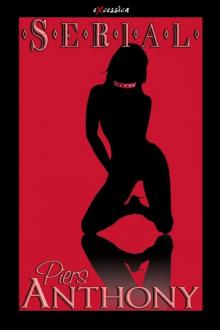 Serial
Serial Question Quest
Question Quest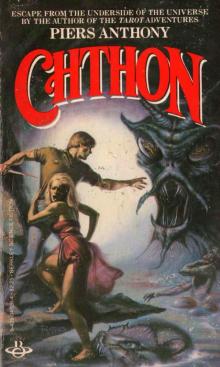 Chthon
Chthon Dragon on a Pedestal
Dragon on a Pedestal E. S. P. Worm
E. S. P. Worm Hope of Earth
Hope of Earth The Series Boxed Set
The Series Boxed Set Blue Adept
Blue Adept The Sopaths
The Sopaths Beetle Juice
Beetle Juice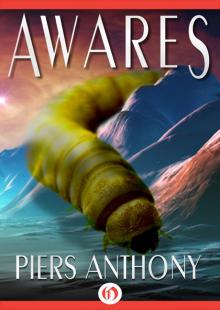 Awares
Awares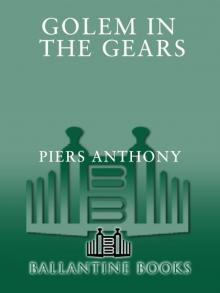 Golem in the Gears
Golem in the Gears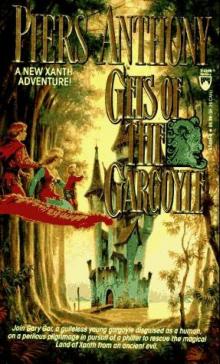 Geis of the Gargoyle
Geis of the Gargoyle Bamboo Bloodbath and Ninja's Revenge
Bamboo Bloodbath and Ninja's Revenge Heaven Cent
Heaven Cent Neq the Sword
Neq the Sword Pandora Park
Pandora Park Juxtaposition
Juxtaposition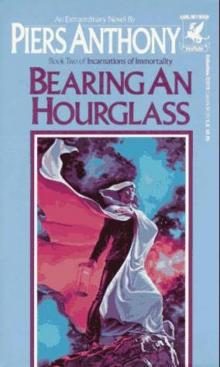 Bearing an Hourglass
Bearing an Hourglass Dragon Assassin
Dragon Assassin Board Stiff
Board Stiff Virtual Mode
Virtual Mode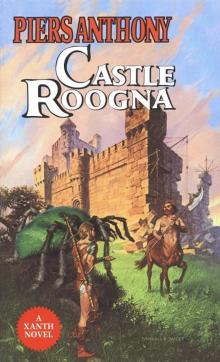 Castle Roogna
Castle Roogna Aliena Too
Aliena Too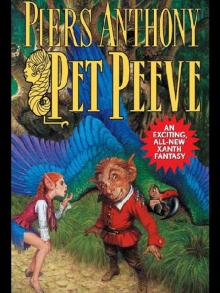 Pet Peeve
Pet Peeve The Metal Maiden Collection
The Metal Maiden Collection Volk
Volk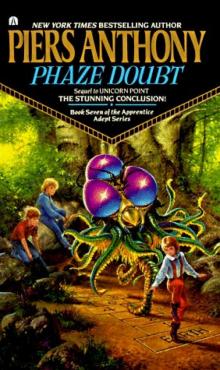 Phaze Doubt
Phaze Doubt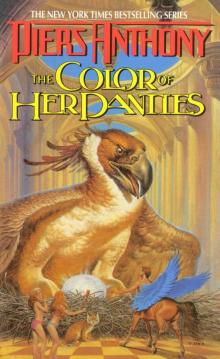 The Color of Her Panties
The Color of Her Panties Amazon Slaughter and Curse of the Ninja Piers Anthony
Amazon Slaughter and Curse of the Ninja Piers Anthony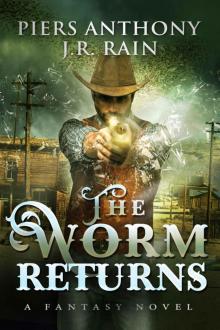 The Worm Returns
The Worm Returns Zombie Lover
Zombie Lover Xone of Contention
Xone of Contention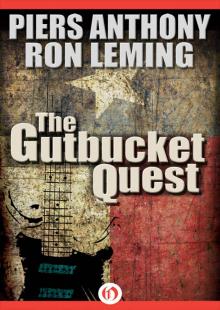 The Gutbucket Quest
The Gutbucket Quest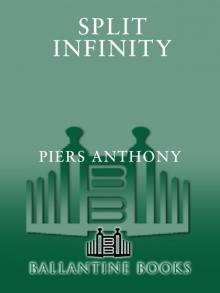 Split Infinity
Split Infinity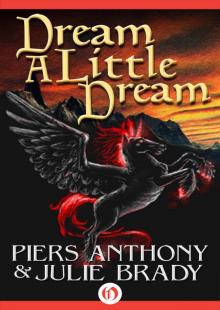 Dream a Little Dream: A Tale of Myth and Moonshine
Dream a Little Dream: A Tale of Myth and Moonshine Balook
Balook Out of Phaze
Out of Phaze The Secret of Spring
The Secret of Spring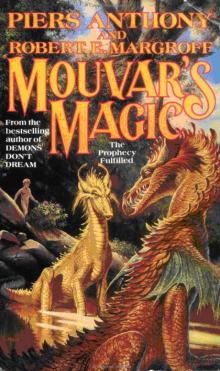 Mouvar's Magic
Mouvar's Magic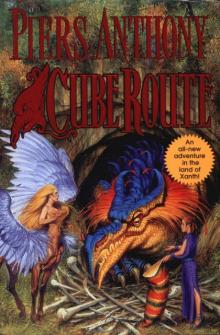 Cube Route
Cube Route Mercenary
Mercenary Total Recall
Total Recall Man From Mundania
Man From Mundania The Magic Fart
The Magic Fart Letters to Jenny
Letters to Jenny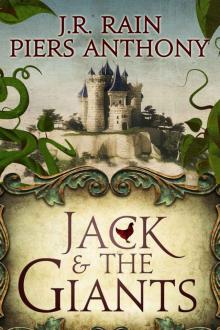 Jack and the Giants
Jack and the Giants Executive
Executive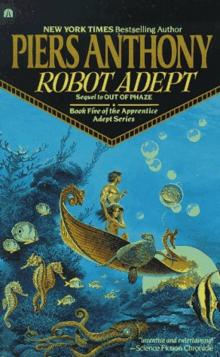 Robot Adept
Robot Adept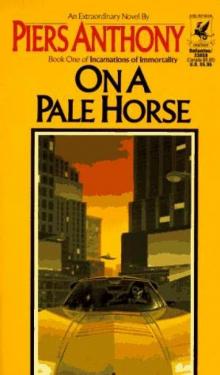 On A Pale Horse
On A Pale Horse Vale of the Vole
Vale of the Vole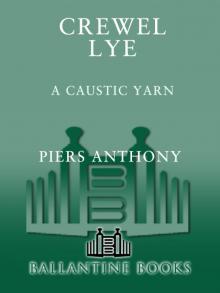 Crewel Lye
Crewel Lye For Love of Evil
For Love of Evil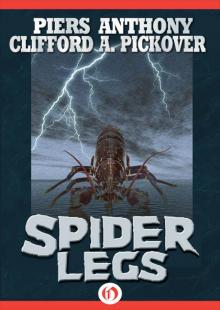 Spider Legs
Spider Legs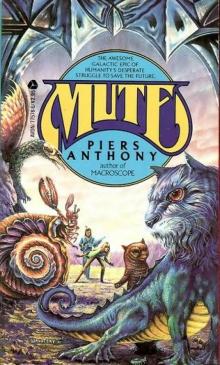 Mute
Mute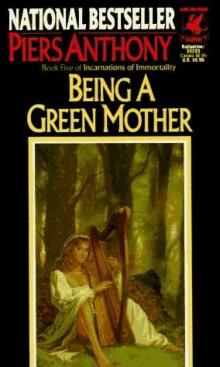 Being a Green Mother
Being a Green Mother Hair Suite
Hair Suite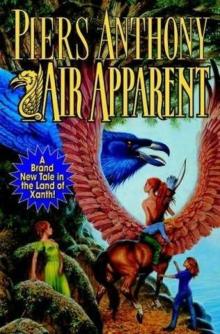 Air Apparent
Air Apparent Politician
Politician Aliena
Aliena Phthor
Phthor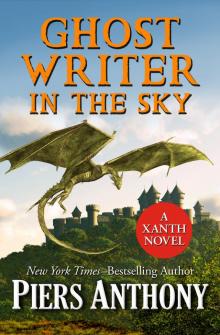 Ghost Writer in the Sky
Ghost Writer in the Sky Pornucopia
Pornucopia Eroma
Eroma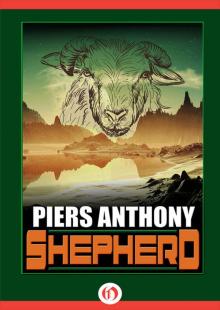 Shepherd
Shepherd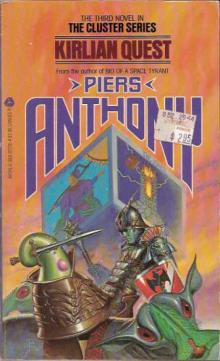 Kirlian Quest
Kirlian Quest Swell Foop
Swell Foop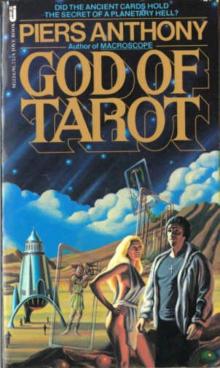 God of Tarot
God of Tarot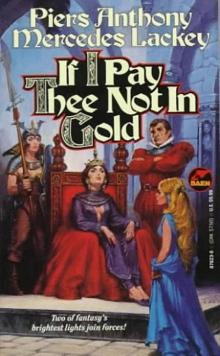 If I Pay Thee Not in Gold
If I Pay Thee Not in Gold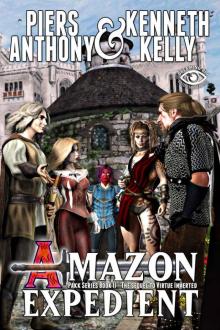 Amazon Expedient
Amazon Expedient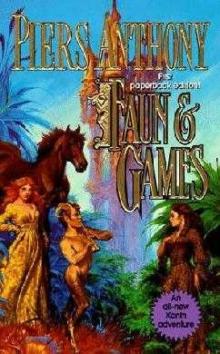 Faun & Games
Faun & Games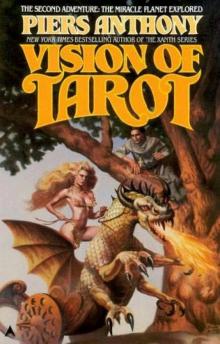 Vision of Tarot
Vision of Tarot Centaur Aisle
Centaur Aisle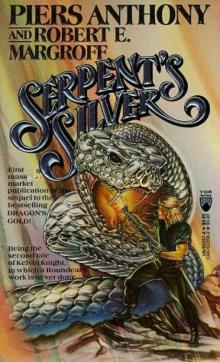 Serpent's Silver
Serpent's Silver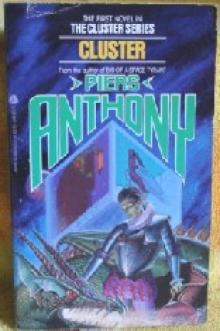 Cluster
Cluster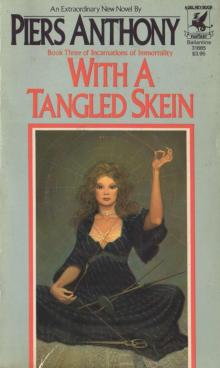 With a Tangled Skein
With a Tangled Skein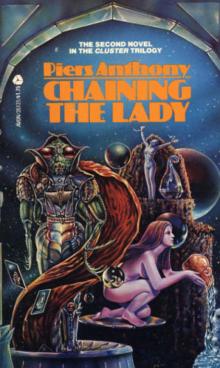 Chaining the Lady
Chaining the Lady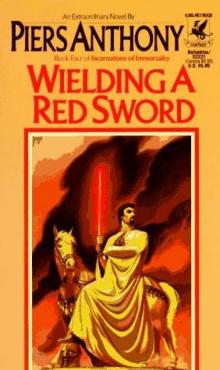 Wielding a Red Sword
Wielding a Red Sword Key to Chroma
Key to Chroma WereWoman
WereWoman Isis Orb
Isis Orb Hair Peace
Hair Peace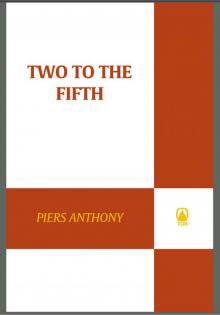 Two to the Fifth
Two to the Fifth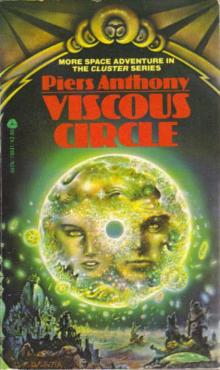 Viscous Circle
Viscous Circle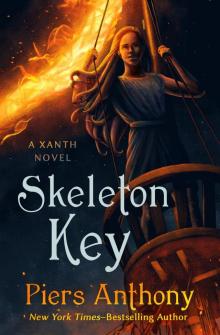 Skeleton Key
Skeleton Key Cautionary Tales
Cautionary Tales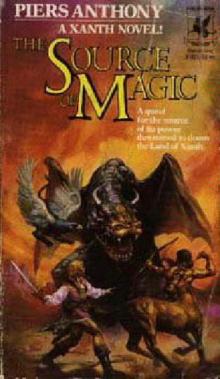 The Source of Magic
The Source of Magic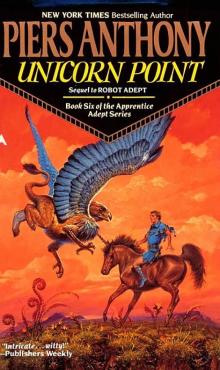 Unicorn Point
Unicorn Point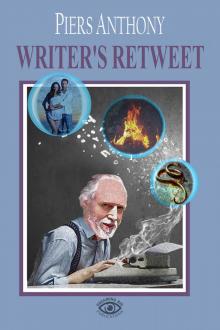 Writer's Retweet
Writer's Retweet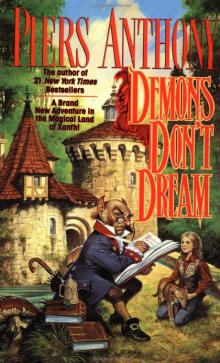 Demons Don't Dream
Demons Don't Dream Ogre, Ogre
Ogre, Ogre The Iron Maiden
The Iron Maiden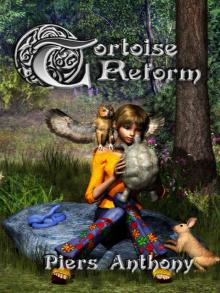 Tortoise Reform
Tortoise Reform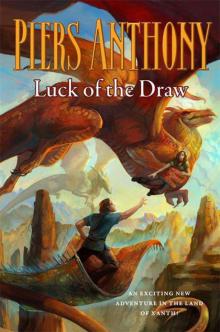 Luck of the Draw
Luck of the Draw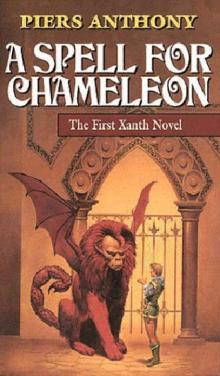 A Spell for Chameleon
A Spell for Chameleon Yon Ill Wind
Yon Ill Wind Currant Events
Currant Events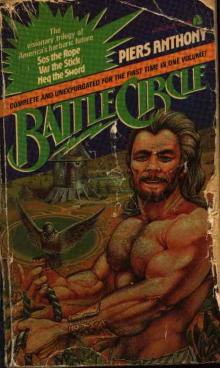 Var the Stick
Var the Stick And Eternity
And Eternity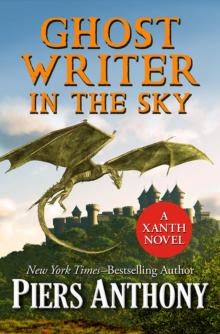 Kiai! & Mistress of Death
Kiai! & Mistress of Death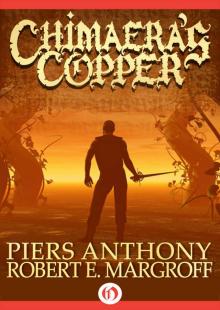 Chimaera's Copper
Chimaera's Copper Refugee
Refugee Isle of View
Isle of View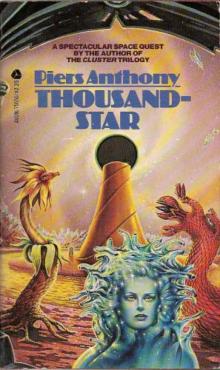 Thousandstar
Thousandstar Mer-Cycle
Mer-Cycle Service Goat
Service Goat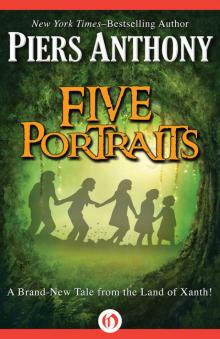 Five Portraits
Five Portraits Night Mare
Night Mare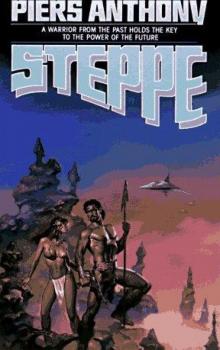 Steppe
Steppe Lavabull
Lavabull Well-Tempered Clavicle
Well-Tempered Clavicle Aladdin Relighted
Aladdin Relighted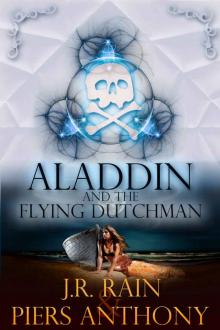 Aladdin and the Flying Dutchman
Aladdin and the Flying Dutchman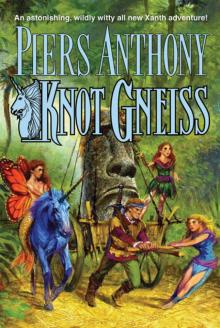 Knot Gneiss
Knot Gneiss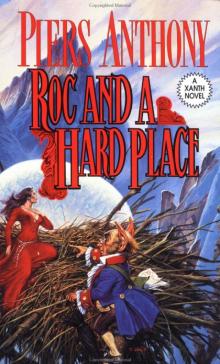 Roc and a Hard Place
Roc and a Hard Place Aladdin Sins Bad
Aladdin Sins Bad Flytrap
Flytrap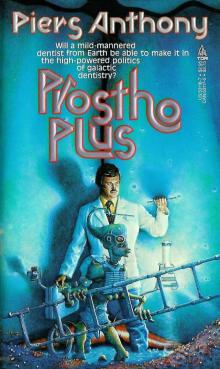 Prostho Plus
Prostho Plus Esrever Doom
Esrever Doom Hair Power
Hair Power The Journey
The Journey Virtue Inverted
Virtue Inverted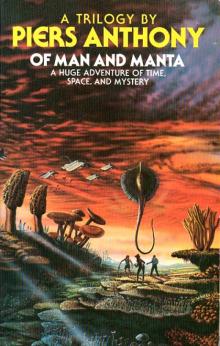 Of Man and Manta Omnibus
Of Man and Manta Omnibus Trail Mix: Amoeba
Trail Mix: Amoeba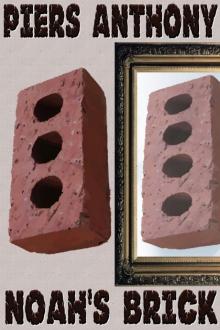 Noah's Brick
Noah's Brick Odd Exam
Odd Exam Magenta Salvation
Magenta Salvation Jest Right
Jest Right Fire Sail
Fire Sail Chthon a-1
Chthon a-1 Amoeba
Amoeba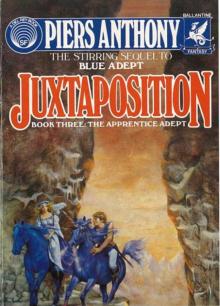 Juxtaposition aa-3
Juxtaposition aa-3 Pira
Pira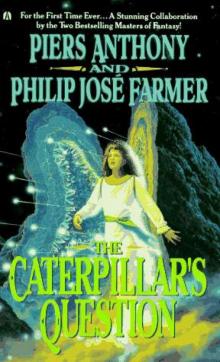 THE CATERPILLARS QUESTION
THE CATERPILLARS QUESTION What Fears Become: An Anthology from The Horror Zine
What Fears Become: An Anthology from The Horror Zine Bio of a Space Tyrant Vol. 3. Politician
Bio of a Space Tyrant Vol. 3. Politician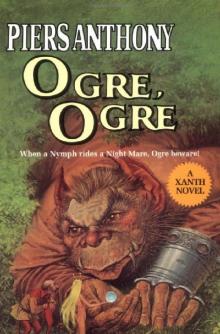 Ogre Ogre x-5
Ogre Ogre x-5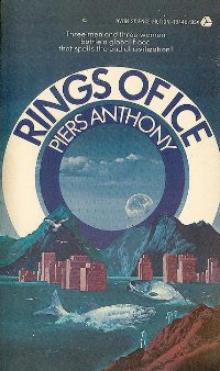 Rings of Ice
Rings of Ice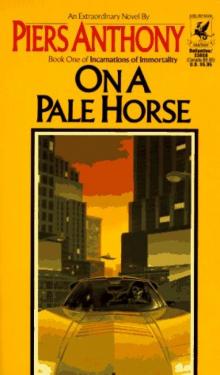 On a Pale Horse ioi-1
On a Pale Horse ioi-1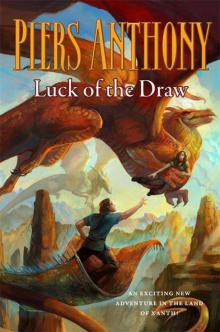 Luck of the Draw (Xanth)
Luck of the Draw (Xanth) Centaur Aisle x-4
Centaur Aisle x-4 Thousandstar (#4 of the Cluster series)
Thousandstar (#4 of the Cluster series)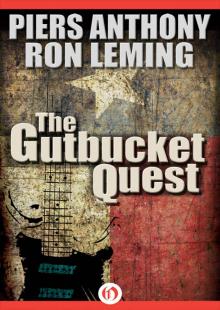 Gutbucket Quest
Gutbucket Quest Isle of Woman (Geodyssey)
Isle of Woman (Geodyssey)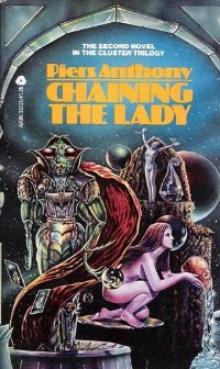 Chaining the Lady c-2
Chaining the Lady c-2 To Be a Woman
To Be a Woman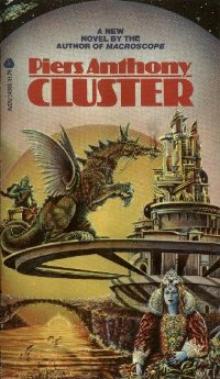 Cluster c-1
Cluster c-1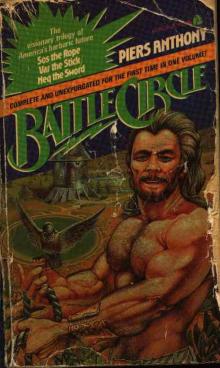 Battle Circle 2 - Var the Stick
Battle Circle 2 - Var the Stick Mercenary (Bio of a Space Tyrant Book 2)
Mercenary (Bio of a Space Tyrant Book 2)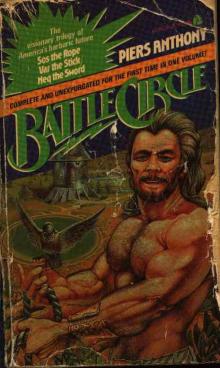 Battle Circle 1 - Sos the Rope
Battle Circle 1 - Sos the Rope Xanth 30 - Stork Naked
Xanth 30 - Stork Naked Secret of Spring
Secret of Spring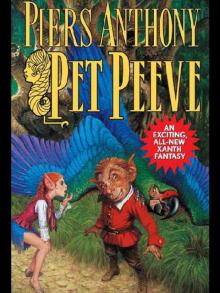 Xanth 29 - Pet Peeve
Xanth 29 - Pet Peeve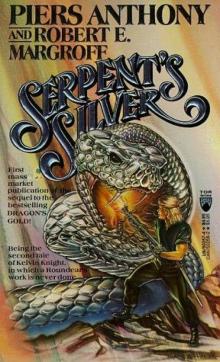 Serpents's Silver
Serpents's Silver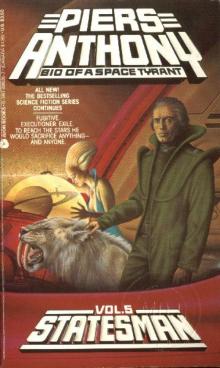 Statesman by Piers Anthony
Statesman by Piers Anthony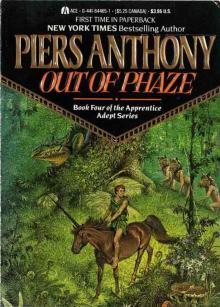 Out of Phaze aa-4
Out of Phaze aa-4 Amazon Slaughter & Curse of the Ninja
Amazon Slaughter & Curse of the Ninja